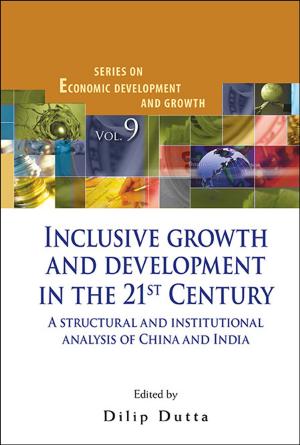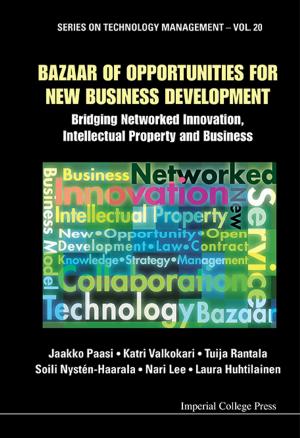Blockchain Economics: Implications of Distributed Ledgers
Markets, Communications Networks, and Algorithmic Reality
Business & Finance, Finance & Investing, Investments & Securities| Author: | Melanie Swan, Jason Potts, Soichiro Takagi | ISBN: | 9781786346407 |
| Publisher: | World Scientific Publishing Company | Publication: | January 29, 2019 |
| Imprint: | WSPC (EUROPE) | Language: | English |
| Author: | Melanie Swan, Jason Potts, Soichiro Takagi |
| ISBN: | 9781786346407 |
| Publisher: | World Scientific Publishing Company |
| Publication: | January 29, 2019 |
| Imprint: | WSPC (EUROPE) |
| Language: | English |
This practical introduction explains the field of Blockchain Economics, the economic models emerging with the implementation of distributed ledger technology. These models are characterized by three factors: open platform business models, cryptotoken money supplies, and Initial Coin Offerings as a new and official form of financing. The book covers a variety of approaches from a business and academic perspective, ranging from financial theory, complexity, and open innovation networks to behavioral economics, self-determination theory, public policy, and financial inclusion.
Unlike existing titles, this book draws on worldwide blockchain industry experts to define the new discipline of Blockchain Economics and provide novel theoretical and conceptual resources for the future of this fast-developing economy. The primer also highlights the wider theme of blockchain as an institutional technology, in that many value transfer interactions might be shifted to automated networks, decreasing the number of human-operated institutions.
As well as stimulating further research, and implementation by business innovators and public policy strategists, the book can also be used as a foundational textbook in courses on Blockchain Economics.
remove
Contents:
-
About the Editors
-
About the Contributors
-
Introduction
-
Economic Theory and Market Structure:
- Blockchain Economic Theory: Digital Asset Contracting Reduces Debt and Risk (Melanie Swan)
- Does Blockchain 'Decentralize' Everything?: An Insight from Organizational Economics (Soichiro Takagi)
- The Blockchain Antidote to Monopolization (Arisa Siong)
-
Blockchain Economic Open Network Innovation:
- Financing Small & Medium Enterprises with Blockchain: An Exploratory Research of Stakeholders' Attitudes (Alex Kayal, Jingwen Yao, Judith Redi and Erich C G Schnoeckel)
- Blockchains for Accelerating Open Innovation Systems for Sustainability Transitions (Rumy Narayan and Annika Tidström)
-
Social Science and Behavioral Economics:
- Blockchain and the Future of Work: A Self-Determination Theory Approach (Horst Treiblmaier and Uwe J Umlauff)
- How Value is Created in Tokenized Assets (John Hargrave, Navroop Sahdev and Olga Feldmeier)
-
Financial Theory and Complexity Science:
- Consensus Algorithms: A Matter of Complexity? (Renato P dos Santos)
- Blockchain Theory of Programmable Risk: Black Swan Smart Contracts (Melanie Swan)
-
Policy, Regulation, and Incentives:
- Entrepreneurial Exit: Developing the Cryptoeconomy (Darcy W E Allen)
- Towards Crypto-friendly Public Policy (Chris Berg, Sinclair Davidson and Jason Potts)
-
Income Inequality and Economic Inclusion:
- The Implications of Blockchain for Income Inequality (Mikayla Novak)
- The Mesh Economy: How Blockchain and Alternative Networks can Bridge the Digital Divide and Facilitate Economic Inclusion (John B Hooks, IV)
-
Glossary
-
Index
Readership: Academic scholars: economics, political theory, finance, network science, social theory, behavioral economics; government policy-makers; lawyers and regulators; advanced career researchers, government leaders, and corporate CEOs as well as those just starting in the field.
Key Features:
- No other book provides a comprehensive vision into the emerging discipline of Blockchain Economics with rigorous academic theorizing to support the developing digital ledger economy
- Research structures, conceptual models, and theories to be explored by academic researchers
- Ideas suggested for entrepreneurial pursuit
- Clear regulation, monopoly, anti-collusion, competitive advantage, and developmental strategies proposed for policy makers and government administrators
- Policy considerations are offered regarding economic empowerment, income inequality, and financial inclusion
- Advice and contextualization for how decentralized ledger technologies may unfold in large entity contexts, organizations and countries
This practical introduction explains the field of Blockchain Economics, the economic models emerging with the implementation of distributed ledger technology. These models are characterized by three factors: open platform business models, cryptotoken money supplies, and Initial Coin Offerings as a new and official form of financing. The book covers a variety of approaches from a business and academic perspective, ranging from financial theory, complexity, and open innovation networks to behavioral economics, self-determination theory, public policy, and financial inclusion.
Unlike existing titles, this book draws on worldwide blockchain industry experts to define the new discipline of Blockchain Economics and provide novel theoretical and conceptual resources for the future of this fast-developing economy. The primer also highlights the wider theme of blockchain as an institutional technology, in that many value transfer interactions might be shifted to automated networks, decreasing the number of human-operated institutions.
As well as stimulating further research, and implementation by business innovators and public policy strategists, the book can also be used as a foundational textbook in courses on Blockchain Economics.
remove
Contents:
-
About the Editors
-
About the Contributors
-
Introduction
-
Economic Theory and Market Structure:
- Blockchain Economic Theory: Digital Asset Contracting Reduces Debt and Risk (Melanie Swan)
- Does Blockchain 'Decentralize' Everything?: An Insight from Organizational Economics (Soichiro Takagi)
- The Blockchain Antidote to Monopolization (Arisa Siong)
-
Blockchain Economic Open Network Innovation:
- Financing Small & Medium Enterprises with Blockchain: An Exploratory Research of Stakeholders' Attitudes (Alex Kayal, Jingwen Yao, Judith Redi and Erich C G Schnoeckel)
- Blockchains for Accelerating Open Innovation Systems for Sustainability Transitions (Rumy Narayan and Annika Tidström)
-
Social Science and Behavioral Economics:
- Blockchain and the Future of Work: A Self-Determination Theory Approach (Horst Treiblmaier and Uwe J Umlauff)
- How Value is Created in Tokenized Assets (John Hargrave, Navroop Sahdev and Olga Feldmeier)
-
Financial Theory and Complexity Science:
- Consensus Algorithms: A Matter of Complexity? (Renato P dos Santos)
- Blockchain Theory of Programmable Risk: Black Swan Smart Contracts (Melanie Swan)
-
Policy, Regulation, and Incentives:
- Entrepreneurial Exit: Developing the Cryptoeconomy (Darcy W E Allen)
- Towards Crypto-friendly Public Policy (Chris Berg, Sinclair Davidson and Jason Potts)
-
Income Inequality and Economic Inclusion:
- The Implications of Blockchain for Income Inequality (Mikayla Novak)
- The Mesh Economy: How Blockchain and Alternative Networks can Bridge the Digital Divide and Facilitate Economic Inclusion (John B Hooks, IV)
-
Glossary
-
Index
Readership: Academic scholars: economics, political theory, finance, network science, social theory, behavioral economics; government policy-makers; lawyers and regulators; advanced career researchers, government leaders, and corporate CEOs as well as those just starting in the field.
Key Features:
- No other book provides a comprehensive vision into the emerging discipline of Blockchain Economics with rigorous academic theorizing to support the developing digital ledger economy
- Research structures, conceptual models, and theories to be explored by academic researchers
- Ideas suggested for entrepreneurial pursuit
- Clear regulation, monopoly, anti-collusion, competitive advantage, and developmental strategies proposed for policy makers and government administrators
- Policy considerations are offered regarding economic empowerment, income inequality, and financial inclusion
- Advice and contextualization for how decentralized ledger technologies may unfold in large entity contexts, organizations and countries















